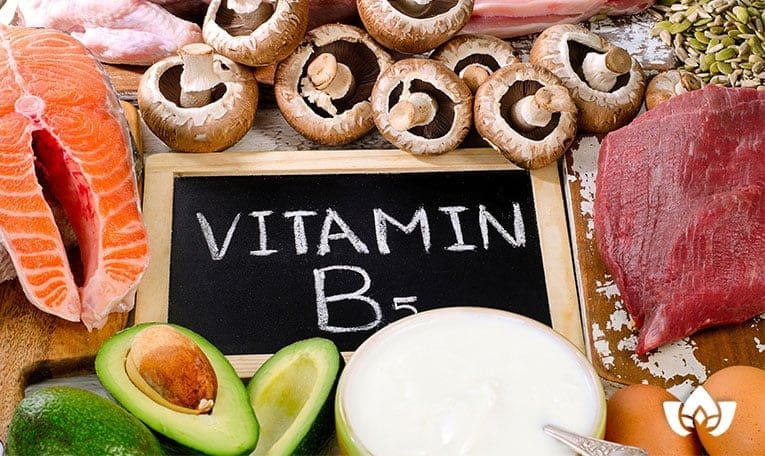
Most people find they didn’t retain as much info from their high school health class as they would have liked, which is why I like to do these articles on the vitamins our bodies need to stay healthy.
My name is Dr. Maria Cavallazzi, and I am a naturopathic doctor in Streetsville; I help my clients by both educating them on their health and diets, as well as prescribing treatments that can help them find a new level of wellness.
Today we’re talking about vitamin B5.
What About Vitamin B4?
If you’re an avid reader of this blog, you may have noticed that the last time we covered a B vitamin, it was vitamin B3.
This time we’re looking at vitamin B5, so what about B4?
To understand that, we need to first understand what a vitamin actually is in the first place.
Vitamins are organic compounds which we need to continue living; vitamin deficiency can lead to a wide range of symptoms, and long-term vitamin deficiency can be deadly.
The difference between vitamins and other supplements, though, is that your body either doesn’t produce enough of them on its own, or it doesn’t produce them at all.
Once upon a time, there was a vitamin B4, but today we call it adenine – it’s one of the four essential components in DNA.
If you’re scientifically-minded, you may recognize the acronym GCAT – adenine is the A in that list (the other three are guanine, cytosine, and thymine).
Adenine is still a helpful nutrient, but because the body can synthesize it on its own, it doesn’t meet the specific definition of “vitamin.”
Perhaps in the future we’ll do an article on these “lost vitamins”, which includes what was once considered vitamins B8, B10, B11, B13, B14, B15, B16, B17, and many more.
What Is Vitamin B5?
Vitamin B5, also known as pantothenic acid, is important in order for your body to properly process carbohydrates, proteins and lipids.
If you don’t get enough B5 through your diet, you can take it as a supplement in order to boost your levels – you’ll notice you’re getting enough when your skin starts looking healthier.
Benefits Of Vitamin B5
There are many conditions that vitamin B5 can help with and great many benefits, as you’ll see from the long list below, though some more effective or more proven than others:
• Alcoholism
• Allergies
• Asthma
• Carpal tunnel syndrome
• Convulsions
• Colitis and constipation
• Dandruff
• Depression
• Diabetic problems
• Dry eyes and eye infections (conjunctivitis)
• Enhancing immune function
• Hair loss
• Heart health
• Headache
• Hyperactivity and possibly ADHD
• Insomnia
• Irritability
• Kidney disorders
• Lung disorders
• Low blood pressure
• Multiple sclerosis
• Muscular dystrophy
• Muscle cramps
• Osteoarthritis and rheumatoid arthritis
• Sinus infection
• Skin irritations
• Sprains
While I do sometimes prescribe it to my patients for one or more of the above, let’s look in more detail to the most common reasons I recommend it, below.

1. Supports Vitamin B2
Not long ago, I did an article on vitamin B2, an important vitamin for normal cell growth and functioning.
Vitamin B5 is good for supporting B2 absorption, which helps the body absorb nutrients and helps maintain its energy levels.
2. Helps Regulate Cholesterol Levels
The link between B5 and improved cholesterol levels has garnered enough attention to result in studies to test and measure its safety and efficacy.
In one triple-blind study, pantetheine (a biologically-active derivative of B5) was administered while subjects followed a ‘therapeutic lifestyle change’ diet.
The results were very encouraging: it demonstrated “significant and sustained reductions” in cholesterol over the course of the sixteen-week trial.
3. Improves Cognitive Performance
Vitamin B5 works with coenzyme-A to synthesize neurotransmitters which affect alertness, memory, mood, and cognition.
As well, it’s part of the process that converts nutrients into energy, which is instrumental in establishing and sustaining mental clarity.
4. Helps With Chronic Stress
You may have heard B5 called the ‘anti-stress’ vitamin – pantothenic acid is one of the ingredients in coenzyme-A, which the adrenal glands use in the manufacture of cortisol and epinephrine.
These are how the body helps process stress, anxiety and depression better, meaning B5 can help to boost your overall mood as well as reducing your stress levels, specifically.
5. Improves Your Ability To Heal From Wounds
Wounds are able to heal more quickly when your diet is flush with vitamin B5, because of how critical it is to cell growth.
Wounds require your body to grow cells in order to close cuts or abrasions, and when your B5 levels are good, it means your body is very efficient at growing those needed healthy cells.
This might also be part of the reason that many athletes like to supplement with B5: because one of its many effects is that it helps the body repair from the damage done to it by rigorous training.
Other benefits
One huge benefit of vitamin B5 is that it helps in the skin’s hydration, which is why you see so many beauty products that have included B5 in their lotions, creams and ointments.
It is applied as a provitamin B5, which transforms into pantothenic acid when it’s absorbed by the skin.
Once absorbed, it helps to not just moisturize, but soothe, regenerate and heal your skin’s condition.
Dietary Sources Of Vitamin B5
Vitamin B5 is easy to come across through dietary sources:
• Chicken, turkey, beef, pork, and especially liver and kidney cuts
• Salmon and shellfish
• Lentils, soybeans, and split peas
• Whole grains and cereals
• Milk, yogurt, egg yolks and other dairy products
No matter whether you have a wide or specific diet, there are enough sources to maintain your vitamin B5 levels; and if not, then supplements are readily available at your local health food store.
Symptoms Of Vitamin B5 Deficiency
Although it’s quite rare to see a B5 deficiency, it would include symptoms such as:
• Fatigue
• Insomnia
• Depression
• Irritability
• Upper respiratory infections
• Stomach pains
• Vomiting
• Burning feet
Call The Mindful Healing Clinic
If you see one or more ailments you’re suffering from on that long list above, you should consider seeing a naturopathic doctor to have your vitamin levels checked and to put a plan in place to address any deficiencies.
Vitamin B5 deficiency may be rare, but these symptoms may be related to a deficiency in another vitamin.
I’d be happy to provide my recommendations, so call now and book yourself a 15-minute FREE assessment so that we can meet and determine how to help you moving forward.
Until next time,
Dr. Maria Cavallazzi, N.D
Mindful Healing Naturopathic Clinic
Mississauga, ON L5M 1L7
(905) 819-8200
► https://g.page/MindfulClinicNaturopathic
Dr. Maria Cavallazzi is a medical doctor from Colombia where she practiced as a family physician for 8 years until she moved to Canada 16 years ago and became a naturopathic doctor in Mississauga.


